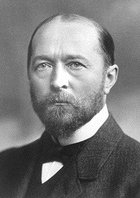|
Emil von Behring (1854-1917)

Emil Adolf Behring was born on March 15, 1854
at Hansdorf, Deutsch-Eylau (today Poland).
1878 Medical degree. He was then sent to Posen in Poland to the Chemical
Department of the Experimental Station.
1881-1883 he carried out important investigations on the action of iodoform,
stating that it does not kill microbes but may neutralize the poisons
given off by them, thus being antitoxic.
1893 The title of Professor was conferred upon him. Behring's most important
researches were intimately bound up with the epoch-making work of Pasteur,
Koch, Ehrlich, Löffler, Roux, Yersin and others, which laid the
foundation of our modern knowledge of the immunology of bacterial diseases;
but he is, himself, chiefly remembered for his work on diphtheria and
on tuberculosis.
In 1890 Behring and S. Kitasato published their
discovery that graduated doses of sterilised brothcultures of diphtheria
or of tetanus bacilli caused the animals to produce, in their blood,
substances which could neutralize the toxins which these bacilli produced
(antitoxins). They also showed that the antitoxins thus produced by
one animal could immunize another animal and that it could cure an animal
actually showing symptoms of diphtheria. This great discovery was soon
confirmed and successfully used by other workers.
Behring himself saw in his production of this toxin-antitoxin mixture
the possibility of the final eradication of diphtheria; and he regarded
this part of his efforts as the crowning success of his life's work.
From 1901 onwards Behring's health prevented him from giving regular
lectures and he devoted himself chiefly to the study of tuberculosis.
The Behringwerke were sponsored for the manufacture of sera and vaccines
and for experimental work on these.
In 1901, the year of his Nobel Prize, he was raised to the nobility.
Behring died at Marburg on March 31, 1917.
|
